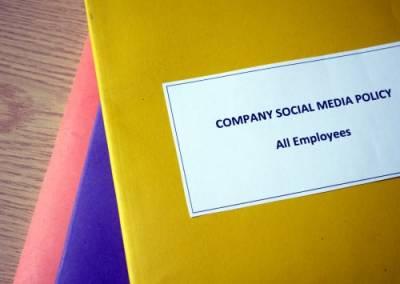
 847-995-1205
847-995-1205
Recent Blog Posts
Illinois Governor Signs Restrictive Covenant Bill Into Law
 On August 13, 2021, Illinois Governor J.B. Pritzker signed into law an amendment to the Illinois Freedom to Work Act (820 ILCS § 90), which imposes restrictions on the use of non-competition and non-solicitation (employee and customer) restrictive covenants for Illinois employees. The law takes effect on January 1, 2022, and only applies to restrictive covenants entered into after January 1, 2022.
On August 13, 2021, Illinois Governor J.B. Pritzker signed into law an amendment to the Illinois Freedom to Work Act (820 ILCS § 90), which imposes restrictions on the use of non-competition and non-solicitation (employee and customer) restrictive covenants for Illinois employees. The law takes effect on January 1, 2022, and only applies to restrictive covenants entered into after January 1, 2022.
Below are some of the key provisions of the law:
- The law prohibits employers from entering into non-competition agreements with employees who earn $75,000 per year or less and also prohibits employers from entering into non-solicit agreements with employees who earn $45,000 per year or less.
- For non-compete agreements, the salary threshold amounts will increase every five years by $5,000 until January 1, 2037, when the amount will equal 590,000. For non-solicit agreements, the salary threshold amounts will increase every five years by $2,500 until January 1, 2037, when the amount will equal $52,500.
Chicago Passes New Sick Leave and Wage Theft Protection Ordinance
 In June, the Chicago City Council voted yes to a new ordinance that addresses sick leave and wage theft protections for people who work in the city. This new ordinance is in addition to another new ordinance our firm discussed in a prior post regarding the minimum wage change Chicago enacted and the potential penalties for violations.
In June, the Chicago City Council voted yes to a new ordinance that addresses sick leave and wage theft protections for people who work in the city. This new ordinance is in addition to another new ordinance our firm discussed in a prior post regarding the minimum wage change Chicago enacted and the potential penalties for violations.
New Law
The ordinance, SO2021-2182, applies to any business that employs four or more employees. If the employee is a domestic worker, then the law applies to businesses with one or more employees. The new ordinance is for any employee who works two or more hours within the city limits of Chicago during any two-week period.
Under the new ordinance, which went into effect July 1, employees can use their paid sick leave for the following reasons:
-
Absences that are a result of family-care facility closures
Employment Law Concerns for Employers Continuing Remote Work
 When the COVID-19 pandemic first hit, many employers were forced to quickly adapt to a new way of conducting business. For many businesses, this meant allowing employees to work from home. Employers had to find ways to ensure that remote workers were still meeting the requirements expected of them while employees had to find ways to juggle emails, online discussion boards, and video conferences from their living rooms. While switching to remote work was a major adjustment for many people, employers and employees are starting to recognize the benefits of work-from-home opportunities. If you are one of the many employers who intend to continue remote work indefinitely, make sure you understand the employment law implications you may face.
When the COVID-19 pandemic first hit, many employers were forced to quickly adapt to a new way of conducting business. For many businesses, this meant allowing employees to work from home. Employers had to find ways to ensure that remote workers were still meeting the requirements expected of them while employees had to find ways to juggle emails, online discussion boards, and video conferences from their living rooms. While switching to remote work was a major adjustment for many people, employers and employees are starting to recognize the benefits of work-from-home opportunities. If you are one of the many employers who intend to continue remote work indefinitely, make sure you understand the employment law implications you may face.
Avoiding Discrimination in Work-From-Home Opportunities
Understandably, an employee's ability to effectively conduct work duties remotely depends largely on the employee's type of work. Some jobs are simply not suited for remote work. If some of your workers are allowed to work from home and others are not, make sure that there are documented, legitimate reasons for the differences in opportunities. Failure to do so can lead to accusations of discrimination.
UPDATE: What Are the Penalties for Minimum Wage Violations in Illinois?

Originally Published: 21 July 2020 - Updated: July 7, 2021
On July 1, 2021, the minimum wage in Chicago became $15-an-hour. For servers and other workers who receive tips, the minimum wage is $9-an-hour. In Cook County, the minimum wage is $13-an-hour for regular employees and $6.60 for workers who receive tips. The state minimum wage in Illinois is currently $11-an-hour with a $1 increase scheduled to take effect January 1 of next year. By 2025, workers in Illinois are all set to receive $15-an-hour.
Reactions to the current and proposed wage increases have been mixed. Workers are thrilled, but many employers are concerned about how the new minimum wage law will impact their business. If you are an employer in Illinois, it is crucial that you stay updated on wage laws. Failure to adhere to minimum wage increases can lead to significant legal and financial consequences.
Source: https://abc7chicago.com/minimum-wage-chicago-illinois-2021-cook-county/10849920/
Why Do Employers Need a Strong Social Media Policy?
 As an employer, you may assume that what your employees do off the clock is none of your business. While this is true to a certain degree, your employees are an extension of your business. Consequently, the actions that your employees take online can reflect on your company. This is especially true when employees post information about business matters on social media. A clear, understandable social media policy is crucial to protecting your company's reputation and preventing sensitive company information from being shared online.
As an employer, you may assume that what your employees do off the clock is none of your business. While this is true to a certain degree, your employees are an extension of your business. Consequently, the actions that your employees take online can reflect on your company. This is especially true when employees post information about business matters on social media. A clear, understandable social media policy is crucial to protecting your company's reputation and preventing sensitive company information from being shared online.
Protecting Proprietary and Confidential Information
Employees often have access to confidential information like customer contacts, employee personnel files, proprietary business practices, trade secrets, and sensitive financial information. One of the key concerns regarding social media is that employees will intentionally or unintentionally share confidential information online. Your social media policy should address what information is confidential and explain clearly that this information may not be posted online. Remind employees that social media messages, posts, and pictures may still be accessible by others even if their account is set to "private." In some cases, a social media policy alone is insufficient. You may also need to use a non-disclosure or confidentiality agreement to ensure that sensitive information is not leaked online.
Employers Continuing Remote Work Must Be Watchful for Legal Pitfalls
 Concerns over the spread of COVID caused many employers to transition to remote work. Although many workplaces are returning to a sense of normalcy, some employers are choosing to continue remote work. Companies like Amazon, Microsoft, and Spotify have officially decided to extend work-from-home opportunities past the pandemic. Many small businesses are following suit. If you are an employer with remote workers, it is essential that you understand the possible legal implications of remote work. Issues like worker classification and overtime pay may be especially complicated when workers are working remotely.
Concerns over the spread of COVID caused many employers to transition to remote work. Although many workplaces are returning to a sense of normalcy, some employers are choosing to continue remote work. Companies like Amazon, Microsoft, and Spotify have officially decided to extend work-from-home opportunities past the pandemic. Many small businesses are following suit. If you are an employer with remote workers, it is essential that you understand the possible legal implications of remote work. Issues like worker classification and overtime pay may be especially complicated when workers are working remotely.
Misclassifying Employees as Independent Contractors
Traditionally, most work-from-home positions were independent contractor positions. Now, more and more employees are working from home. In many businesses, employers' needs are met by a combination of independent contractors and employees. If you choose to utilize independent contractors in your business, you must ensure that these workers meet the criteria necessary for contractor classification. Contractors must:
Illinois Governor Signs New Employee Anti-Discrimination Law
 On March 23, 2021, Illinois Gov. J.B. Pritzker signed into law the Employee Background Fairness Act. The new law adds an amendment to the Illinois Human Rights Act (IHRA) regarding how an employer can address a potential employee's criminal conviction record. Under the IHRA, a person's arrest record can not be held against them in the hiring process or once they have been hired, however, the new law extends these protections to a person's conviction record. The new law went into effect immediately upon the governor's signing.
On March 23, 2021, Illinois Gov. J.B. Pritzker signed into law the Employee Background Fairness Act. The new law adds an amendment to the Illinois Human Rights Act (IHRA) regarding how an employer can address a potential employee's criminal conviction record. Under the IHRA, a person's arrest record can not be held against them in the hiring process or once they have been hired, however, the new law extends these protections to a person's conviction record. The new law went into effect immediately upon the governor's signing.
Any individual – whether going through the hiring process or already working for an employee – who feels that they are being discriminated against because of a prior conviction or convictions may file a complaint with the Illinois Department of Human Rights (IDHR).
The law does have two exceptions where an employer can consider an individual's conviction record either during the hiring process or after that individual is already employed by the company:
What Are Common Concerns Regarding Illinois Independent Contractors?
 The COVID-19 pandemic has changed the way we live and work. Employers and employees alike have adapted to different work situations and environments, including more flexible remote options. Statistics show that independent contractors made up 6.9% of the total number of workers employed in 2017. As a business owner, you may have full-time, salaried employees or part-time, contract employees, or a combination of both. Independent or freelance workers can provide several benefits, such as special knowledge or skills, staffing flexibility, and overall cost savings. However, it is important to note the legal requirements and differences between independent contractors versus salaried employees.
The COVID-19 pandemic has changed the way we live and work. Employers and employees alike have adapted to different work situations and environments, including more flexible remote options. Statistics show that independent contractors made up 6.9% of the total number of workers employed in 2017. As a business owner, you may have full-time, salaried employees or part-time, contract employees, or a combination of both. Independent or freelance workers can provide several benefits, such as special knowledge or skills, staffing flexibility, and overall cost savings. However, it is important to note the legal requirements and differences between independent contractors versus salaried employees.
Thinking Outside the Box
Although independent contractors typically charge an hourly rate, this can be cost-effective in the long run. If they are experts in their field, this saves time on training and onboarding. In addition, they only need to be employed for a designated amount of time, or as long as a project takes to be completed. Many employers are able to verify a contractor's reputation by speaking to other companies that used their services, or by reviewing samples of their work.
How Can Business Contracts Protect Illinois Employers?
 Starting your own business or becoming your own boss can be a dream come true for many people. In the business world, contracts are essential because they outline the work to be performed as well as the prices that must be paid for services. In general, a contract clearly states the expectations of all the involved parties, whether it is for salaried, hourly, or freelance employees. Additionally, these legal documents can protect the parties if those expectations are not met by designating the consequences for any breach in the agreement. When one party does not hold up their end of the bargain, as they say, the other party may take legal action. An experienced business attorney can make sure that all the necessary information is included in a contract to safeguard against disagreements that may affect a business owner's livelihood.
Starting your own business or becoming your own boss can be a dream come true for many people. In the business world, contracts are essential because they outline the work to be performed as well as the prices that must be paid for services. In general, a contract clearly states the expectations of all the involved parties, whether it is for salaried, hourly, or freelance employees. Additionally, these legal documents can protect the parties if those expectations are not met by designating the consequences for any breach in the agreement. When one party does not hold up their end of the bargain, as they say, the other party may take legal action. An experienced business attorney can make sure that all the necessary information is included in a contract to safeguard against disagreements that may affect a business owner's livelihood.
New 2021 Law Raises Minimum Wage for Illinois Workers
 Laws are established for various reasons, mainly to keep citizens safe and provide for a fair society. The state of Illinois has several new laws taking effect in 2021, one of which affects employers and their employees. The minimum wage will increase to $11 per hour for standard workers; $6.60 per hour for tipped workers, and $8.50 per hour for workers under the age of 18 who work less than 650 hours in a calendar year. This new legislation is part of a staggered plan that will eventually raise the minimum wage to $15 per hour by 2025. However, many retailers have expressed concern that they cannot afford this new hourly rate after struggling to stay open during the pandemic. Whether you own a small start-up or a well-established company, it is important to understand the legal consequences for hourly wage violations in Illinois.
Laws are established for various reasons, mainly to keep citizens safe and provide for a fair society. The state of Illinois has several new laws taking effect in 2021, one of which affects employers and their employees. The minimum wage will increase to $11 per hour for standard workers; $6.60 per hour for tipped workers, and $8.50 per hour for workers under the age of 18 who work less than 650 hours in a calendar year. This new legislation is part of a staggered plan that will eventually raise the minimum wage to $15 per hour by 2025. However, many retailers have expressed concern that they cannot afford this new hourly rate after struggling to stay open during the pandemic. Whether you own a small start-up or a well-established company, it is important to understand the legal consequences for hourly wage violations in Illinois.
A Gradual Increase
Although the wage rate increase for 2021 is meant to assist the entire Illinois workforce, it will gradually increase depending on what part of the state you live in. On July 1, 2021, the minimum wage in Chicago will increase to $15 per hour, or $14.50 per hour for employees at companies with 20 or fewer employees. The minimum wage for tipped workers will increase to $9.00 per hour, and employers are required to make up the difference if the base wage plus tips does not equal $15.00 per hour.
Contact Us


Schaumburg, IL 60173
Phone: 847-995-1205
